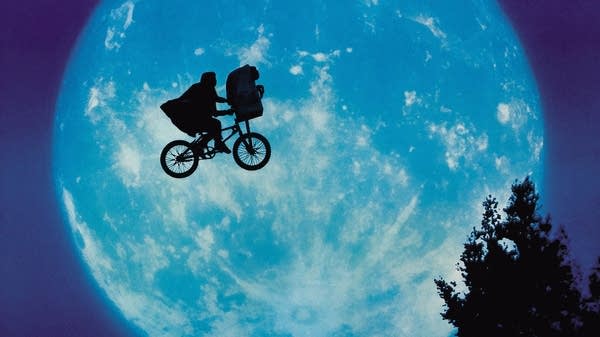How do you make Steven Spielberg's classic film E.T. the Extra-Terrestrial even more magical? Add an orchestra.
The orchestra is already there, of course: in the Oscar-winning score by John Williams. Now, though, the film has been edited to allow the score to be performed live by orchestras such as the Minnesota Orchestra, which is playing E.T. this weekend at Orchestra Hall under the baton of Steven Reineke. The film screens above the band, and it's still so absorbing that you find yourself almost forgetting you're hearing a live orchestra.
34 years after its original release, E.T. holds up as one of the all-time great feats of cinematic storytelling. It may be the single purest distillation of Spielberg's gifts as a filmmaker: the story of young Elliott's friendship with E.T. can be seen as, among other things, a metaphor for our relationship with movies themselves. We're drawn in, we're changed, and then we wipe our tears and go back to our families.
The screenplay, by the late Melissa Mathison, is diamond-like in its perfection: examine it from any angle, and it works. The relationship between the boy and the alien is ostensibly at its center, but the reason the story so deeply resonant is that ultimately, it's really about Elliott's family.
It's an immensely poignant portrait of these four people — Elliot, his older brother Michael (Robert MacNaughton), his kid sister Gertie (Drew Barrymore, iconic), and their newly single mom Mary (Dee Wallace). We see their daily lives, the realistic flashes of conflict (at the famous "Penis breath!" line, Mary bursts out laughing before she restrains herself and scolds her son) balanced by moments like Michael's flash of concern for his mother after Elliott mentions his father's new girlfriend.
(Spielberg was inspired by his own experiences as a child with divorcing parents, and it's astonishing to watch E.T. today and reflect that it was released a full decade before Vice President Dan Quayle lashed out at single mother Murphy Brown as an exemplar of moral decay. It's telling to read reviews of E.T. published at the time of its release: critics focused on the family's struggles, rather than its strength.)
We see how, in these trying circumstances, cross-generational ties emerge. Elliot's request that his siblings make "the most excellent promise" before he introduces them to E.T. is echoed, later, by Michael saying the same thing to his mother. When, in the end, Elliott has to choose between going with E.T. and staying home, we are moved because we truly understand what Elliott is staying for.
Seeing the film with a live orchestra serves as a reminder of just how integral a partner the composer is to the work of the writer and director. That's true of any movie with an original score, but particularly in this case. The scene where E.T. lifts Elliott's bike off the ground is one of the most famous examples of film scoring in cinematic history, and justly so. Williams's sweeping, Romantic score — with one of his many perfect melodies — makes you believe that extraordinary things are possible in the world.
(E.T. is also one of the great bike movies from a decade that had more than its share. Compared to the drivers, the bikers are younger, more dextrous, and more virtuous. If you're a bicyclist who was an '80s kid, you may still occasionally find yourself thinking of E.T. when you go spinning off somewhere.)
Live film scores have become a staple of many orchestras' seasons over the past couple of years, and the more of these performances I see, the happier I am that the practice is spreading. Not only is it a reflection of the fact that film composers are now the most popular living composers, and their work should be heard in its proper context, it's a reminder of the bridge between movie music and classical music. In working his movie magic, Williams was standing on the shoulders of every preceding composer in the repertoire, and watching a live orchestra perform his score vividly illustrates how he learned his tricks.
It's also a reminder of what a collaborative process filmmaking is. Performing the E.T. score, the musicians of the Minnesota Orchestra are standing in for the original L.A. session players whose work has enlivened the experiences of millions of moviegoers. Behind every great movie alien there are hundreds of unseen helpers — and in this case, dozens of them are in the orchestra.
The Minnesota Orchestra plays E.T. again today, Oct. 29, at 2 p.m.
Love the music?
Show your support by making a gift to YourClassical.
Each day, we’re here for you with thoughtful streams that set the tone for your day – not to mention the stories and programs that inspire you to new discovery and help you explore the music you love.
YourClassical is available for free, because we are listener-supported public media. Take a moment to make your gift today.

